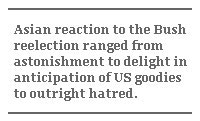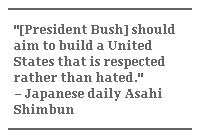US Election and the World – Part III
US Election and the World – Part III

DHAKA: The evening of the American presidential election, Prime Minister Shaukat Aziz of Pakistan relaxed in the midst of an official visit to Dhaka with friends at an informal reception.
As the returns pouring in to Bangladesh via satellite television indicated a Bush victory, guests offered congratulations to the prime minister as if he never had left the United States, where he had spent many of his best years earning a fortune as a Citibank executive.
"And he was accepting the congratulations," said a guest later.
Aziz's cheerfulness reflected the relief of the generals, the masters in Pakistan, that remaining in the White House was the president who has supported them in power in they hope they some day might help him find Osama bin Laden.

Whatever their private sentiments, other Asian leaders in countries where up to 80 percent of men and women in the street would have voted against Bush, decided to stay on the right side of the Americans. They said they were happy to have Bush for another four years. Bush's staunchest ally in the region, Australian Prime Minister John Howard, was elated, even though public opinion and media remain critical of the United States.
As Dawn, Pakistan's most influential daily newspaper, put it: "Pakistan under General Pervez Musharaff had developed a certain level of comfort working with the Bush administration and would no doubt feel relieved that there might be no immediate need for a re-working of personal and bilateral relationships"
In a more formal statement to Bangladeshi editors, Aziz said "there will be continuity in the policies of his government. We wish the best for him. His re-election will continue encouraging the peace process in south Asia."
Just in case Bush did not get the message, Aziz also told the editors Pakistan did not need to learn lessons on democracy from anywhere.
In this vast stretch of territory beyond a mere continent called Asia reaction to the Bush reelection at all levels ranged from astonishment to delight in anticipation of US goodies to outright hatred.

Indian Prime Minister Manmohan Singh telephoned Bush to congratulate him and, to the dismay of his Leftwing coalition partners, invite him to visit India. Singh wrote to Bush about "our shared vision and common values (that) provide an enduring base for our relations." Obviously happy about the growing military and technological cooperation, Singh added: "India and the US together, and in partnership based on trust and mutual confidence, can make a positive difference to issues of global significance in this century."
Reflecting some of the public mood, The Times of India called for a "course correction in the US strategy of absolute unilateralism, adopted by the neo-con advisors of President Bush in his first term….One hopes Bush will introspect on his mistakes of the first term and act with a great sense of judgment to ensure his place in history."
Prime Minkister Thaksin Shinawatra of Thailand, on better terms with Bush than his own head of state, King Bhumibol Adulyadej, immediately hopped on the telephone to Bush; President Gloria Macapagal of the Philippines coyly signed her official, letter of congratulations "Gloria."

A persistent theme in official congratulatory statements as well as news media commentary – both controlled and somewhat free – was a hope of the sort that springs eternal: that somehow, the re-elected Bush would change from the first-term Bush to a leader not only more flexible in outlook, but, perhaps, dare we say it, more like John Kerry.
Or, as The Nation of Bangkok put it: "A kinder, gentler US under the re-elected American president could work wonders in international relations."
"It would be ungracious at this time of his triumph to suggest that Mr. Bush may not look at the non-evangelical world outside his moral kampong more kindly than before especially since his eyes will be on his presidential legacy," wrote long-time Indian commentator Pranay Gupte. "But it would be irresponsible to assume that he's going to change or that his frenzied supporters don't want the Bush legacy to be anything other than manifest superiority. It's scary."
Zafar Sobhan, who left behind two prestigious Manhattan law firms, to return to Bangladesh to become an editor of The Daily Star, the country's most influential English-language daily, sadly concluded in an article headlined, "What's the Matter with America?" that the election results reflect the true nature of Americans: "There isn't much you can do about an electorate so deeply mired in delusion and denial."
Malaysian Prime Minister Abdullah Ahmad Badawi, who as head of the Non-Aligned Movement and the Organization of Islamic Conference does not often get a chance to offer congratulations to colleagues on free elections, advised the re-elected president, "if there are any new approaches to be taken by the president in relation to Iraq and Palestine for instance, I hope the views of world leaders, organizations like the OIC and NAM are taken into account."
Congratulations were warm from the leaders of the two most important states in East Asia: Japan and China.

Prime Minister Junichiro Koizumi already had stated before the election that "President Bush should hang in there," a remark that seemingly put him at odds with Japanese public opinion as expressed by the daily Asahi Shimbun, which commented after the vote: "….most people showed support for Kerry rather than Bush. The president should not make light of this fact. He should aim to build a United States that is respected rather than hated by changing his policy toward Iraq and peacemaking."
As for China's President Hu Jintao, Bush in the White House was fine insomuch as "China and the United States have made significant progress in cooperation…bringing substantial benefits to both countries…." And just in case anyone missed the real message, Foreign Ministry spokeswoman Zhang Qiyue added: "The smooth development of Sino-US relations depends on the careful handling of the Taiwan issue on the part of the US."
And since President Hu has a cozy advantage of a controlled press, his remarks are against the context of an article published a day before the election in China Daily, the English-language Communist Party mouthpiece, by the still useful Qian Qichen, a retired foreign minister and vice premier, noting:
"The United States has not changed its Cold War mentality….The philosophy of the 'Bush Doctrine'…. advocates the United States shall rule over the whole world with overwhelming force, military force in particular."
Typical of educated person-in-the street reaction came from Zhong Song-yi ,a student in China's southern city Guangzhou, "We will see how Bush is going to adjust his diplomatic policy because the US has irritated millions of Muslims and his 'allies.' The US army has trampled the territory of Iraq…. If things really go like what Bin Laden mentioned in the video, those states that voted for Bush would be attacked by terrorism."
The bottom line is that individuals, governments, and the news media saw the election through the prism of their own self-interest. If one can be audacious enough to summarize Asia's reaction, the official reaction ranges from polite congratulations to hope for better ties. The popular reaction and editorial comments, however, reveal more puzzlement and anxiety about four more years of unilateralist America.
Arnold Zeitlin, a former UPI vice president for Asia-Pacific and AP bureau chief in Asia, watched the election results in Dhaka, Bangladesh.